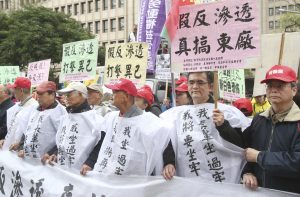Taiwan’s legislature passed an anti-infiltration act targeted at curbing Chinese influence in the island’s politics, a move its supporters say is long overdue but critics say threatens the country’s democracy.
The law, backed by the ruling Democratic Progressive Party (DPP) and passed on Tuesday in a party-line vote boycotted by the opposition Kuomintang (KMT), heightens penalties for Chinese-backed efforts to lobby Taiwanese politicians or participate in election campaigns.
It comes just before Taiwan votes in January 11 presidential and legislative elections, leading to accusations by both sides that the law is being used as a political tool.
KMT-affiliated figures protested outside the legislature on Tuesday as DPP politicians passed the act, which the ruling party claimed was a necessary measure amid threats by Beijing to Taiwan’s sovereignty.
President Tsai Ing-wen defended the law on Wednesday, saying it is designed to safeguard Taiwan’s democracy and will not affect those who are not acting on behalf of the Chinese government.
“It is the Anti-Infiltration Act, not an ‘anti-exchange act,’” Tsai said in a New Year’s Day speech, arguing the law is necessary to ensure China does not threaten the nation’s sovereignty but would not target cross-strait actors uninvolved in political affairs.
“Those doing business, studying, or engaging in any normal exchanges will not be affected,” she said.
Han Kuo-yu, the Kaohsiung mayor who is challenging Tsai for the presidency, called the new act a “bad law” and pledged to review it if he wins the presidency and the KMT takes control of Taiwan’s legislature.
Former KMT President Ma Ying-jeou compared the law to Taiwan’s martial law era, drawing a strong rebuke from DPP politicians who insisted the act will protect, not suppress, democracy.
China’s Taiwan Affairs Office also criticized the bill, accusing the DPP of using it to seek electoral gain and heighten cross-strait tensions.
Anti-infiltration legislation has long been a tricky topic in Taiwan. While many Taiwanese welcome government efforts to curb Chinese influence and safeguard the country’s democracy, there was considerable debate within the DPP on how to pass legislation without infringing on personal and political freedoms, as well as cross-strait trade.
Past efforts to criminalize the spread of “fake news” – proposed after a Chinese journalist reported false information in the wake of a February 2018 earthquake in eastern Taiwan – drew opposition from international observers and Taiwanese voters and were ultimately scrapped.
But recently Taiwan has been rocked by reports that China’s Taiwan Affairs Office is directly influencing media coverage within the country.
In July, a Financial Times report quoted journalists at China Times and CtiTV, both owned by a pro-Beijing business tycoon, as saying they receive daily calls from Beijing to shape news coverage.
Still, DPP politicians agonized for months over potential legislation before Tsai abruptly announced the bill at a December 15 campaign rally – just two weeks after self-proclaimed Chinese spy Wang Liqiang defected to Australia and said he had been involved in political infiltration efforts in Taiwan, throwing the island’s election into turmoil.
The new act, however, is fairly limited in scope, focusing on political donations, lobbying, disrupting social order, disrupting elections, or aiding in elections. Violators of the act face up to five years in prison and a fine of up to NT$10 million, or US$332,810.
Some legislators had proposed more comprehensive legislation that would require state-sponsored actors to register as foreign agents. The United States has used similar laws to force media outlets like China’s state-backed Xinhua and Russia’s RT to operate as state-sponsored entities.
Taiwan’s new law, however, has sparked fear among some corporations operating within the country.
On Tuesday evening, hours after the law was passed, the board of Master Chain, a Taiwanese media startup that operates in China, announced it would cease all operations in Taiwan.
China Times said on Wednesday it would sue local online news outlet Up Media after it claimed in a report that China’s Taiwan Affairs Office instructed news organizations helmed by Want Want China Times Media Group – and its China-friendly chairman, Tsai Eng-meng – to suspend their operations in protest of the anti-infiltration law.
China Times said in a statement it will consider how to continue presenting reports and commentary without violating the act.
Tsai Ing-wen, however, insisted on Wednesday the new law would not lead to government intervention in Taiwan’s media, citing the island’s strong press freedom rankings.
“No upright media company operating in Taiwan would engage in illicit activity on China’s behalf,” she said.
































